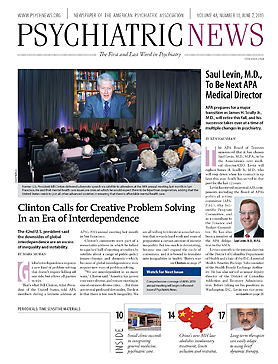For decades researchers have been searching for a single test, perhaps a blood or genetic test, that will unequivocally solve the mystery of depression and simplify its treatment, just like cholesterol measurements have done for heart attacks and a genetic test has done for Huntington’s disease. The magic test has not been found, but scientists are closer than ever to a large variety of tests to achieve this goal.
Why search for biomarkers for depression when the disorder has been identified and measured by clinical-interview-based diagnostic criteria for decades?
Biomarkers can, for example, help researchers better understand the causes and pathologies of different subtypes of depression, which in turn can lead to more successful treatments. Biomarkers can also help clinicians devise faster and more effective treatments based on each patient’s pathology. In addition, biomarkers might identify people at risk for depression but who do not meet diagnostic criteria, not unlike cholesterol monitoring before people develop heart disease.
In recent years, biomarker research has benefited from increased investment and can boast of several discoveries. In 2010, the National Institute of Mental Health (NIMH) launched the Establishing Moderators/Mediators for a Biosignature of Antidepressant Response in Clinical Care (EMBARC) study at four academic sites.
Biomarkers will lead everyone to “think fundamentally differently about depression treatment,” said Madhukar Trivedi, M.D., the principal investigator of the EMBARC study in an interview with Psychiatric News. Trivedi is a professor of psychiatry at the University of Texas Southwestern Medical Center.
“We know that depression is clearly a very heterogeneous disease,” Trivedi said, and therefore the likelihood of finding a single test for all depressive patients is growing ever smaller. Rather, the EMBARC study is testing a variety of possible biomarkers, including blood tests, brain scans, genetic mutations, epigenetic markers, and cognitive behavioral indicators.
Tests Focus on Stress-Related Physiology
Researchers have identified a number of chemical signals in blood that are linked to subpopulations of depressed patients. These include cytokines that promote inflammatory response, stress hormones such as cortisol, and neurotrophic factors such as brain-derived neurotrophic factor (BDNF).
In a study published in Molecular Psychiatry online August 28, 2012, Chad Rethorst, Ph.D., Trivedi, and colleagues reported that the levels of certain cytokines can predict and/or measure patients’ response to an exercise regimen as augmentation to a not-entirely-effective SSRI. Although previous studies suggested that patients with high baseline level of tumor necrosis factor (TNF) tend to have poor response to antidepressants, these types of patients responded much better to exercise than did patients without high baseline level of TNF. They also found that IL-1beta, another pro-inflammatory cytokine, is correlated with depression symptom scores and may be an indicator of treatment effectiveness, at least when the treatment is exercise.
Also, a study published in the January JAMA Psychiatry suggested that elevated C-reactive protein (CRP), an indicator of systemic inflammation, may be a biomarker for a subset of depressive patients. Charles Raison, M.D., and colleagues gave TNF-antagonist infliximab to 60 patients with treatment-resistant depression. It did not work for all patients, but did work for a small subset of patients who had high levels of high-sensitivity CRP
Gene Expression Also Blood-Based Marker
Gene expression is another type of blood test that may reveal the pathology of depression and mechanisms of treatment response. The amounts of mRNA of certain genes indicate which genes are active or inactive, and these patterns are compared between healthy volunteers and patients or between treatment responders and nonresponders.
An analysis of the GENDEP study, a European pharmacogenetic study on the genetic basis for different response to escitalopram and nortriptyline, was conducted by Annamaria Cattaneo, Ph.D., and colleagues and published in the February Neuropsychopharmacology. The expression of several candidate genes was measured through the corresponding mRNAs in patients and healthy volunteers. Higher baseline levels of IL-1beta, TNF-alpha, and macrophase inhibiting factor predicted lack of response to the antidepressants. Surprisingly, a different set of biomarkers correlated with symptom reduction over time, namely decreasing IL-6 and FKBP5 (a marker for glucocorticoid receptor function) expression and increasing BDNF and VGF (both indicators of neuronal growth) levels.
In several previous NIMH studies, scopolamine, a cholinergic muscarinic receptor blocker usually used to treat motion sickness, has been shown to exert an antidepressant effect within three days. In a new NIMH study published in the March JAMA Psychiatry, Maura Furey, Ph.D., and colleagues were able to predict depressed patients’ response to scopolamine intravenous infusion using functional MRI scans. Brain activities were recorded while patients performed mental tasks that required the use of working memory. In the test, the patient was asked to recognize, remember, and match facial expressions of emotions such as sad, happy, fearful, or neutral in photographs.
Eleven of 15 patients responded to scopolamine treatment in the study; the other four were nonresponders. The authors found that baseline scan signals in the bilateral middle occipital cortex predicted treatment response to scopolamine. Changes over time in this signal also correlated with patients’ clinical response to scopolamine over time. The authors noted that the cholinergic system and visual-processing center in the brain are involved in the pathophysiology of depression in at least some patients.
Neuroimaging biomarkers are also being studied in the EMBARC study, which is expected to produce results in the next few years, according to Trivedi. “Like other chronic complex diseases such as lupus…you don’t have one test for all cases,” said Trivedi. To guide precise diagnosis and individualized treatment, future clinicians may use an index derived from several different biomarkers and, if the response is less than expected, order other tests to adjust treatment based on an algorithm.
The Canadian Depression Biomarker Network, led by Sidney Kennedy, M.D., a professor of psychiatry at the University of Toronto, is carrying out research similar to EMBARC. Six academic centers are involved in this network. ■
